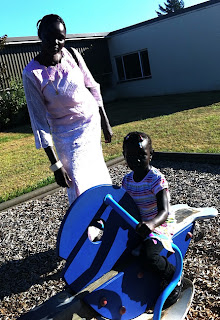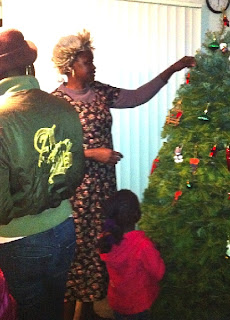"I had the opportunity in December to sit down with Deborah, a refugee from the Sudan who is being helped by Catholic Charities. Her story is saddening, and yet inspiring.
She came to Oregon with her
family (herself, six daughters, and one son) from Kenya one year ago.
Originally from the southern part of the Sudan (what is now South Sudan, as of
July 2011), she had left Sudan for Ethiopia in the early 1990s, and then left
Ethiopia for Kenya in 1992, where most of her children were born and they
stayed until they came to the United States. As I sit on her couch across
from her, accompanied by Sarah (a Jesuit volunteer with Catholic Charities) she
describes the journey: the flight from Nairobi to Chicago, the flight from
Chicago to Oregon, how the expedition took two days. She says that it was
cold when she got here, and she had no coat. She began applying to come
to the United States in 2006 – it was now December 8th, 2010, and
she and her family were finally here. She tells me how she cried from
happiness.
 |
| Deborah and her youngest daughter |
Deborah was resettled in
Portland by the Kurdish Human Rights Watch—Catholic Charities took over her
case shortly after her arrival. She was shown her apartment – her new home – by
her family’s resettlement case manager, who showed her how to lock the door,
how to work the shower, how to use the refrigerator, how to operate the
microwave. She even did not know what a case manager was – all of these
new things were thrust upon her, her first day settled her new country.
She learned how to use all of her new appliances, and learned how helpful the
case managers could be – finding things for you, working with you to get help,
finding someone you can ask for help. She also learned to deal with
disappointment: case managers, as helpful as they are, are not perfect, and her
Kurdish Human Rights Watch case manager would frequently promise things but
would not be able to follow through, sometimes not at all and sometimes not for
a very long time.
One of the most important
aspects of American life the Catholic Charities case managers have been able to
help Deborah with is school for her children. Deborah and the children
explained to me the differences between an American and an education in Africa:
there is no good education there, there are no English classes, there are a few
books, and they mostly taught in Swahili. As different as the schools are
between Kenya and America, the children hardly remember their first day of
school: they could not understand anything said to them and stayed quiet,
unless they were speaking to the few fellow students who spoke Swahili.
The children simply described everything in America as “good,” whether it is
food, education, medicine, or anything else.
 |
| Deborah, decorating her first Christmas tree |
Communication is difficult for
the entire family. Deborah herself has taken three English classes – one
at Mount Hood Community College, one from IRCO (Immigrant and Refugee Community
Organization), and one other through DHS. The first meets a few times a
week, but the IRCO class met every day of the week, and they assign practice
work for every night. One of the most difficult parts, Deborah told me,
is studying—it is tough with the children distracting her while she is trying
to learn how to read. She did not write at all in Africa, so learning to
read and write in a completely different language is even more difficult.
She speaks an amazing – at least in comparison to most Americans – number of
languages: Swahili, Dinka (the language of the Dinka people who come from the
western area of what is now South Sudan), some Arabic, and Nuer (another tribal
language of South Sudan).
Currently Deborah hopes that one day she can bring her mother to live with her
family here in the United States. Details of where her mother was before
are unclear, but she does have Deborah’s two nephews with her in Kakuma now.
Deborah worries that if certain people find out about where she is living her
mother might be killed--currently she does not even know if her sister is alive
or dead. Deborah expressed her regrets about not knowing her own mother;
it has been so long since she saw her that she does not remember her at
all. She simply wants her family to be together in the United States.
Deborah said to me that she is going to live here until her hair is white, but
she has “hope, hope, hope” that she can one day bring her mother here too. We
wish Deborah all the luck in the world; she certainly deserves it."

No comments:
Post a Comment